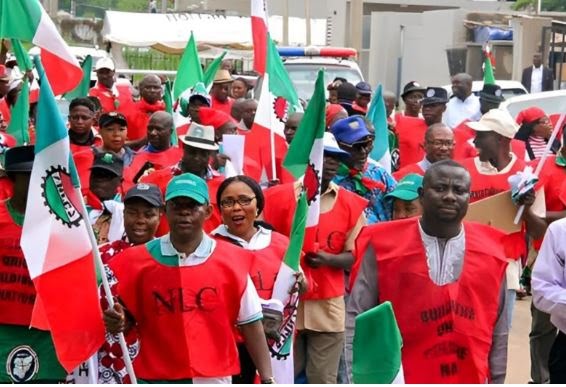- Says Governors have acted in bad faith
The Nigeria Labour Congress (NLC) asserts that state governors can afford to pay a minimum wage above ₦60,000 by curbing corruption and reducing the high cost of governance in their states.
This statement was released late Friday by NLC spokesperson Benson Upah, responding to the Nigeria Governors’ Forum’s claim that the proposed ₦60,000 minimum wage by the Federal Government is unsustainable.
In a statement titled “SAVE THE COUNTRY FROM A CERTAIN DEATH,” the NLC expressed alarm at the Governors’ Forum’s assertion that some states might need to borrow to meet this wage.
The NLC argued, “We do believe the Governors have acted in bad faith. It is unheard of for such a statement to be issued to the world in the middle of an ongoing negotiation. It is certainly in bad taste.”
Refuting the governors’ claims, the NLC pointed out that the Federation Account Allocation Committee (FAAC) allocations have increased from ₦700 billion to ₦1.2 trillion, significantly boosting state revenues.
The NLC stressed that governors could afford to pay a reasonable national minimum wage by cutting the high cost of governance, minimising corruption, and prioritising workers’ welfare.
The NLC clarified that a national minimum wage is a baseline that no employer should pay below, designed to protect the weakest and poorest workers.
The NLC criticised government policies such as fuel subsidy removal, currency devaluation, energy tariff hikes by 250%, and interest rate hikes by 26.5%, arguing these measures hurt the economy and the poor.
Read the full statement by the NLC:
SAVE THE COUNTRY FROM A CERTAIN DEATH
We are alarmed by the statement credited to the Nigeria Governors Forum that state governments cannot even afford to pay N60,000 as
minimum wage as “a few states will end up borrowing to pay workers every month”.
We do believe the Governors have acted in bad faith. It is unheard of for such a statement be issued to the world in the middle of an on-going negotiation. It is certainly in bad taste.
As for the veracity of their claim, nothing can be further from the truth as FAAC allocations have since moved from N700 billion to N1.2 trillion. making the governments extremely rich at the expense of the people.
All that the governors need to do to be able to pay a reasonable national minimum wage (not even the N60,000) is cut on the high cost of governance, minimise corruption as well as prioritise the welfare of workers.
It is important to explain here that a national minimum wage is not synonymous with the different pay structures of different states. The national minimum wage is the lowest floor below which no employer is allowed to pay. The aim is to protect the weak and the poor.
We are not fixated with figures but value. Those who argue that moving the national minimum wage from N30,000 to N60,000 is sufficiently good enough miss the point. In 2019, when N30,000 became the minimum, N300 exchanged for $1 (effectively making the minimum wage an equivalent of $100 or thereabout) while inflation rate was 11.40.
At the moment the exchange rate is at N1,600 to $1 while inflation hovers at 33.7% (40% for food). This puts the value of the minimum wage at $37.5 for a family of six. This is happening at a time costs of everything rose by more than 400% as a result of the removal of fuel subsidy. This is an extreme bad news for the poor.
Government’s policies of fuel subsidy removal, mindless devaluation of the Naira, energy tariff hike by 250% and interest rate hike by 26.5% will continue to hurt the economy (especially manufacturing sector) and the poor.
Already manifest is the mass incapacity of Nigerians leading to overflowing warehouses of the productive sector of the economy. The downward trend will continue except the capacity of workers and businesses is enhanced.
Paying a miserable national minimum wage portends grave danger to not only the workforce but the national economy as in truth, economies of most states are driven by workers wages.
In light of this, we urge the governors to do a re-think and save the country from a certain death.
Benson Upah
Head of Information and Public Affairs
